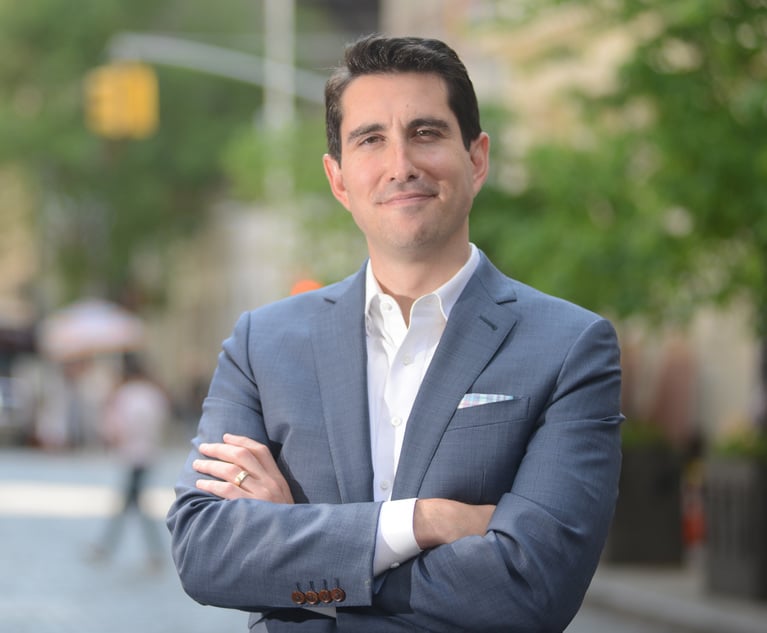Tobacco Companies Support Legislation Raising Smoking Age
According to Campaign for Tobacco-Free Kids, Hawaii, California, New Jersey, Oregon, Maine, Massachusetts and Virginia have laws that raised the age from 18 to 21 for consumers to purchase and use tobacco products.
February 27, 2019 at 06:16 PM
4 minute read
 E-cigarette/photo credit by Christopher Ames/iStockphoto.com
E-cigarette/photo credit by Christopher Ames/iStockphoto.com
With seven states having passed laws that make it illegal to buy tobacco under the age of 21, the push for further state and federal legislation to increase the age when people can buy and use tobacco products is supported by the tobacco industry.
However, those who have fought big tobacco companies in court say the industries' support of these bills is a last-ditch effort to save itself from further scrutiny and try to avoid even stricter regulations.
According to Campaign for Tobacco-Free Kids, Hawaii, California, New Jersey, Oregon, Maine, Massachusetts and Virginia have laws that raised the age from 18 to 21 for consumers to purchase and use tobacco products.
Scott Schlesinger, an attorney at Schlesinger Law Offices in Fort Lauderdale, Florida, who represents plaintiffs in Engle progeny smoking-related injury suits, said that tobacco companies are only now supporting the efforts to raise the age to buy tobacco products because they know that kind of legislation will take a long time to go through.
“They could choose not to sell to people under 21,” Schlesinger said.
In an opinion piece published on The Hill on Tuesday, Altria CEO Howard Willard said he also supports raising the age of buying and using tobacco products to the age of 21 since it would lead to a lower addiction rate.
A representative for Altria on Wednesday said the company supports raising the minimum age for using tobacco products.
“We agree that the current trends in underage e-vapor use must be addressed. Tobacco harm reduction for adults cannot succeed without effective measures to reduce underage use of all tobacco products,” the representative wrote in an email. “The best approach to achieving this goal is to increase the minimum age for purchasing tobacco products to 21. We fully support states acting now to pass legislation to increase the minimum age. Taking this important step will address the main way underage youth gain access to tobacco products today—from friends who are of legal age.”
In November, Murray Garnick, the general counsel of Altria, said in a press release that he supported state laws and federal laws to raise the age to buy tobacco products.
“We welcome [the] FDA's efforts to address the underage use of e-vapor products. That is why we believe Congress should raise the legal age of purchase for all tobacco products to 21,” Garnick said in the press release. “We also applaud [the] FDA's continued recognition of the potential for innovative, less harmful products that can deliver nicotine to adults who want them.”
A representative for tobacco company RAI Group said no one was available for comment on Wednesday.
“The RAI Group believes that youth should never use tobacco products, including vapor products, and we support federal and state legislation that increases the minimum age of purchase to 21 in the U.S.,” the representative wrote in an email to Corporate Counsel. “Because many youth obtain vapor products from friends between the ages of 18 and 21, raising the age of purchase to 21 will help prevent teens from acquiring the products through social sources, thereby keeping vapor products out of middle and high schools.”
Ted Kwon, a spokesman for Juul, which is partially owned by Altria, said the company is committed to preventing teenagers from becoming addicted to tobacco products.
“Tobacco 21 laws have been shown to dramatically reduce youth smoking rates, which is why we strongly support raising the minimum purchase age for all tobacco products, including vaping products like JUUL, to 21,” Kwon said in an email to Corporate Counsel. “Our secure website, JUUL.com, already requires all purchasers to be 21 and over. We look forward to working with policymakers at the federal, state and local levels to achieve Tobacco 21.”
Vince Willmore, the vice president of communications at Campaign for Tobacco-Free Kids, explained that many tobacco companies seek to have Tobacco 21 laws passed over stricter laws banning the sale of flavored tobacco products. He said the laws the tobacco industry tends to support lack enforcement on the tobacco industry and would rather punish underage consumers.
This content has been archived. It is available through our partners, LexisNexis® and Bloomberg Law.
To view this content, please continue to their sites.
Not a Lexis Subscriber?
Subscribe Now
Not a Bloomberg Law Subscriber?
Subscribe Now
NOT FOR REPRINT
© 2025 ALM Global, LLC, All Rights Reserved. Request academic re-use from www.copyright.com. All other uses, submit a request to [email protected]. For more information visit Asset & Logo Licensing.
You Might Like
View All
MLB's Texas Rangers Search for a New GC and a Broadcasting Deal

Survey Finds Majority of Legal Professionals Still Intimidated by AI Despite Need to Streamline Mounting Caseloads

Kraken’s Chief Legal Officer Exits, Eyes Role in Trump Administration
3 minute read
FTC Chair Lina Khan Sues John Deere Over 'Right to Repair,' Infuriates Successor
6 minute readTrending Stories
- 1Bribery Case Against Former Lt. Gov. Brian Benjamin Is Dropped
- 2‘Extremely Disturbing’: AI Firms Face Class Action by ‘Taskers’ Exposed to Traumatic Content
- 3State Appeals Court Revives BraunHagey Lawsuit Alleging $4.2M Unlawful Wire to China
- 4Invoking Trump, AG Bonta Reminds Lawyers of Duties to Noncitizens in Plea Dealing
- 522-Count Indictment Is Just the Start of SCOTUSBlog Atty's Legal Problems, Experts Say
Who Got The Work
J. Brugh Lower of Gibbons has entered an appearance for industrial equipment supplier Devco Corporation in a pending trademark infringement lawsuit. The suit, accusing the defendant of selling knock-off Graco products, was filed Dec. 18 in New Jersey District Court by Rivkin Radler on behalf of Graco Inc. and Graco Minnesota. The case, assigned to U.S. District Judge Zahid N. Quraishi, is 3:24-cv-11294, Graco Inc. et al v. Devco Corporation.
Who Got The Work
Rebecca Maller-Stein and Kent A. Yalowitz of Arnold & Porter Kaye Scholer have entered their appearances for Hanaco Venture Capital and its executives, Lior Prosor and David Frankel, in a pending securities lawsuit. The action, filed on Dec. 24 in New York Southern District Court by Zell, Aron & Co. on behalf of Goldeneye Advisors, accuses the defendants of negligently and fraudulently managing the plaintiff's $1 million investment. The case, assigned to U.S. District Judge Vernon S. Broderick, is 1:24-cv-09918, Goldeneye Advisors, LLC v. Hanaco Venture Capital, Ltd. et al.
Who Got The Work
Attorneys from A&O Shearman has stepped in as defense counsel for Toronto-Dominion Bank and other defendants in a pending securities class action. The suit, filed Dec. 11 in New York Southern District Court by Bleichmar Fonti & Auld, accuses the defendants of concealing the bank's 'pervasive' deficiencies in regards to its compliance with the Bank Secrecy Act and the quality of its anti-money laundering controls. The case, assigned to U.S. District Judge Arun Subramanian, is 1:24-cv-09445, Gonzalez v. The Toronto-Dominion Bank et al.
Who Got The Work
Crown Castle International, a Pennsylvania company providing shared communications infrastructure, has turned to Luke D. Wolf of Gordon Rees Scully Mansukhani to fend off a pending breach-of-contract lawsuit. The court action, filed Nov. 25 in Michigan Eastern District Court by Hooper Hathaway PC on behalf of The Town Residences LLC, accuses Crown Castle of failing to transfer approximately $30,000 in utility payments from T-Mobile in breach of a roof-top lease and assignment agreement. The case, assigned to U.S. District Judge Susan K. Declercq, is 2:24-cv-13131, The Town Residences LLC v. T-Mobile US, Inc. et al.
Who Got The Work
Wilfred P. Coronato and Daniel M. Schwartz of McCarter & English have stepped in as defense counsel to Electrolux Home Products Inc. in a pending product liability lawsuit. The court action, filed Nov. 26 in New York Eastern District Court by Poulos Lopiccolo PC and Nagel Rice LLP on behalf of David Stern, alleges that the defendant's refrigerators’ drawers and shelving repeatedly break and fall apart within months after purchase. The case, assigned to U.S. District Judge Joan M. Azrack, is 2:24-cv-08204, Stern v. Electrolux Home Products, Inc.
Featured Firms
Law Offices of Gary Martin Hays & Associates, P.C.
(470) 294-1674
Law Offices of Mark E. Salomone
(857) 444-6468
Smith & Hassler
(713) 739-1250






